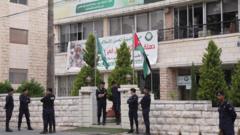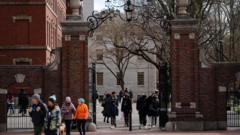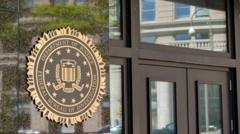In a bold move, Jordan's Interior Minister announced the closure of all Muslim Brotherhood offices, heightening tensions in the region.
Jordan Shuts Down Muslim Brotherhood Amid Alleged Attack Conspiracy

Jordan Shuts Down Muslim Brotherhood Amid Alleged Attack Conspiracy
Jordan's government has declared a ban on the Muslim Brotherhood amidst security threats linked to attack plots involving explosives and drones.
Jordan's government has officially banned the Muslim Brotherhood following the recent arrests of its members, who are accused of conspiring to conduct rocket and drone attacks targeting national security. Interior Minister Mazen al-Faraya made the announcement during a news conference, highlighting that all offices of the Brotherhood would be closed, their assets seized, and any operational activities deemed illegal.
The Islamist group, which operates through its political arm, the Islamic Action Front (IAF), has not yet responded to the ban but has denied any involvement with the alleged attack plots. The primary operations of the IAF, noted for being the largest opposition entity in parliament, were disrupted when police raided its headquarters shortly after the ban was announced. IAF Secretary General Wael Saqqa asserted their identity as an independent political party, emphasizing their commitment to legal procedures and the constitutional framework.
The situation escalated when last week, Jordan's General Intelligence Department detained 16 individuals suspected of plotting attacks intended to disrupt national security, coupled with the possession of weapons, explosives, and plans for drone manufacturing. Faraya indicated that Brotherhood members had been operating covertly, posing risks to national stability.
He further disclosed that authorities had uncovered dangerous materials and sites where explosive devices were made, suggesting a systemic effort to incite chaos. Allegations included attempts by Brotherhood members to destroy compromising documents during police investigations. In contrast, the group maintains its stance of adherence to peaceful approaches.
Founded in Egypt nearly a century ago, the Brotherhood advocates for governance under Islamic law. It faces prohibition in several Arab nations, which view it as a threat. As tensions rise in Jordan, the dynamics of the political landscape could experience profound changes due to this unexpected development.
The Islamist group, which operates through its political arm, the Islamic Action Front (IAF), has not yet responded to the ban but has denied any involvement with the alleged attack plots. The primary operations of the IAF, noted for being the largest opposition entity in parliament, were disrupted when police raided its headquarters shortly after the ban was announced. IAF Secretary General Wael Saqqa asserted their identity as an independent political party, emphasizing their commitment to legal procedures and the constitutional framework.
The situation escalated when last week, Jordan's General Intelligence Department detained 16 individuals suspected of plotting attacks intended to disrupt national security, coupled with the possession of weapons, explosives, and plans for drone manufacturing. Faraya indicated that Brotherhood members had been operating covertly, posing risks to national stability.
He further disclosed that authorities had uncovered dangerous materials and sites where explosive devices were made, suggesting a systemic effort to incite chaos. Allegations included attempts by Brotherhood members to destroy compromising documents during police investigations. In contrast, the group maintains its stance of adherence to peaceful approaches.
Founded in Egypt nearly a century ago, the Brotherhood advocates for governance under Islamic law. It faces prohibition in several Arab nations, which view it as a threat. As tensions rise in Jordan, the dynamics of the political landscape could experience profound changes due to this unexpected development.




















